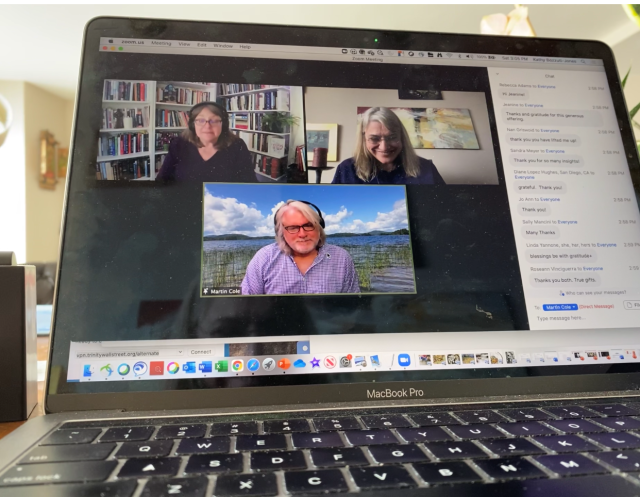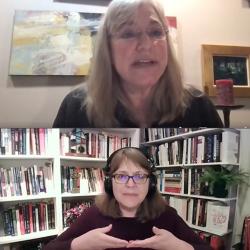What a joy to have co-led an online Trinity Retreat Center Core Values Retreat with my friend, the illustrious author and analyst of culture and faith in society, Diana Butler Bass.
The online retreat, which focused on gratitude, took place earlier this month, as we were finding ourselves near the “beginning of the end” of the pandemic. We investigated the complex trauma of these times, offering a framework and practices for processing our experiences.
Gratitude, Diana pointed out, can be a healing practice for people who have been traumatized. Gratitude is good for us — good for our bodies and for our emotional lives. While not a cure-all, it turns out that gratitude is an essential part of a toolkit for wellness and healing after trauma. This is important because gratitude grounds and centers us in present reality and because it reorients our attention to the constant stream of God’s gifts and graces.
Gratitude offers us an opportunity to change the way we think about the current combined stresses of police violence, racial injustice, inequality, and COVID-19. The key is to develop a “new set of eyes” to view the problems all around us. When we do, it begins to open up creative possibilities that we might otherwise have missed.
Here are some suggestions we explored in the retreat on how to explore gratitude in response to traumatic times.
Enter the present moment through mindfulness and bodily awareness
Taking a cue from trauma therapy and research, “bodily awareness” and “mindfulness of the present moment” can be doorways to growth in gratitude. These tools can help us find a hook into the present moment, where gratitude and acceptance can be found. “Today, we need the capacity to see gifts and to act out of gratitude in the moment,” Diana said, “that is, to widen our periphery and take in more of the world.” Quoting Parker Palmer, she spoke of being open and receptive to “the grace of great things.” This can counter the propensity toward narrow vision in response to stimuli (triggers) or the persistent drumbeat of crisis that characterizes traumatized people.
We are saying thank you... dark though it is.
W.S. Merwin
Explore words and images
Words and images (i.e., how we tell stories in our culture) open our eyes and imaginations to what could be— they give hints and clues about how we might live and where we are heading. Words and images can reweave the connections between us by helping us to reframe the story of our experiences through the lens of gratitude, in hindsight. Gratitude journaling is a tried and true way to harness the power of words, and during the retreat we also explored ways to use images to access gratitude.
We practiced widening our vision with mindfulness meditation, with Visio Divina (contemplative gazing at, or dwelling with, images), as well as with a contemplative photography assignment, in which retreatants set out to “receive images” through the lens of gratitude. The prompt for the camera assignment is also Diana’s recommended prompt for meeting each day during this period of crisis, healing, and recovery: “Put yourself in the presence of the Holy. Look around and ask, ‘What gifts are present in my life, in this moment?’”
Retreatants learned to understand integrity as “bringing their truest selves to the present moment” and gratitude as a reliable method. They noticed (and shared in small groups) all manner of gifts in their contemplative photographs — from a spouse’s love language demonstrated by preparing a simple garden patch, to lush spring blooms, and the sudden play of light on the wall, before it vanished out of sight. Part of the mystery of gratitude, it seems, is that it engages our deep authenticity and integrity, Gratitude, even when times are hard, can often prompt appreciation, wonder, and joy.
Reframe
Reframing the story gives us the ability to see the truth of a situation and to reach for our best and most integrated selves in response as we move forward. Gratitude invites us to look back on difficult life experiences with honest self-interrogation, else we review pre-traumatic events with rose-colored glasses or nostalgia for a perceived time when things were “perfect” or “normal.” Moreover, having a posture of gratitude affects how we understand our present experience — and it lays a foundation of resilience for the future.
Examen
Diana has added a daily Ignatian practice of Examen or “Examination of Consciousness” to her gratitude toolkit, in which she reviews the movements of the day in God’s presence with gratitude and looks forward to tomorrow with hope and confidence.
Try an Examen practice on every part of your life — to sharpen your awareness of God at work all along.
Diana Butler Bass
In short, for Diana Butler Bass, it is the practice of gratitude that continues to help her get through the pandemic. “It strengthened me and gave me perspective,” Diana affirmed. Daily practice of gratitude is not only good for unwinding trauma, but gratitude also strengthens justice, as we open our vision of reality and acknowledge how we have been gifted. And this acknowledgment has the potential to motivate responsive social action.


